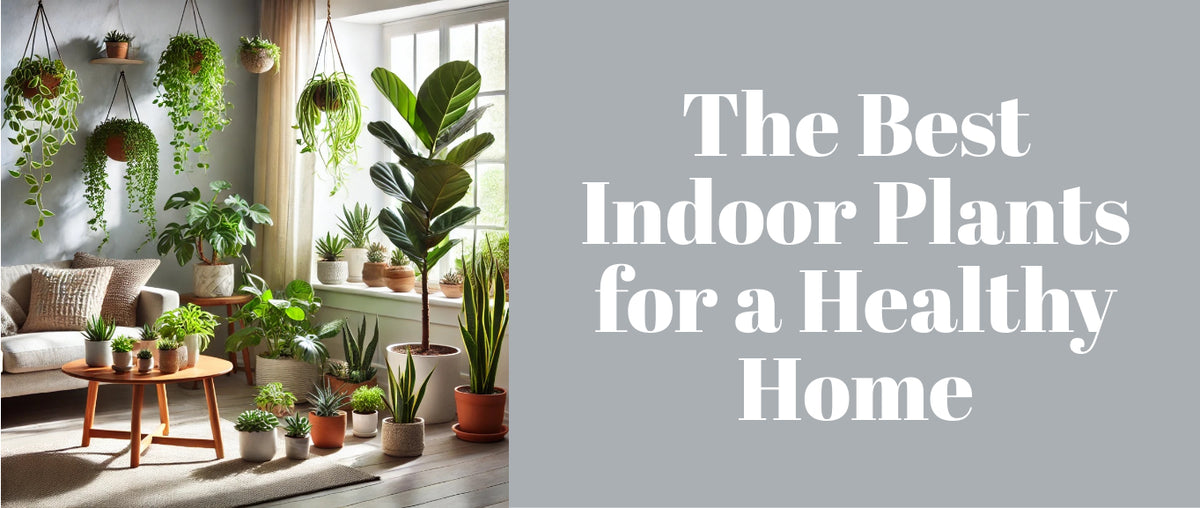The Best Indoor Plants for a Healthy Home
Indoor plants are not only aesthetically pleasing but also contribute significantly to a healthy home environment. They improve air quality, boost mental health, and enhance the overall ambiance of your living space. Incorporating indoor plants into your home can create a serene and inviting atmosphere, promoting healthy eating, a healthy diet, and an overall sense of well-being.
Key Takeaways
- Indoor plants can significantly improve air quality by removing toxins.
- Certain plants can boost mental health and reduce stress.
- Some plants increase humidity levels, which can help with dry skin and respiratory issues.
- Indoor plants can enhance productivity and creativity.
- Specific plants like Spider Plant and Snake Plant are particularly effective for a healthier home environment.
Health Benefits of Indoor Plants
Improved Air Quality
Indoor plants are natural air purifiers. They absorb toxins like formaldehyde, benzene, and trichloroethylene, which are commonly found in household products and can lead to various health issues. According to NASA’s Clean Air Study, certain plants are highly effective in removing these pollutants, thereby improving indoor air quality.
Enhanced Mental Health
Having indoor plants in your living space can significantly boost your mental health. Studies have shown that being around greenery can reduce stress, anxiety, and depression. The presence of plants can create a calming environment, which is essential for maintaining a healthy diet and overall well-being.
Increased Humidity
Plants release moisture into the air through a process called transpiration. This increases humidity levels, which can help alleviate dry skin, respiratory problems, and other health issues caused by dry indoor air. Higher humidity levels can also contribute to better sleep quality, an essential aspect of a heart healthy diet and overall health.
Reduced Stress Levels
The presence of indoor plants can have a soothing effect on the mind. Studies have found that interaction with plants can lower blood pressure, reduce stress levels, and enhance mood. This makes them an excellent addition to any home, especially for those following a Ultimate Vegan Bodybuilding Diet & Tips or other health-focused lifestyle.
Better Sleep Quality
Certain indoor plants, such as lavender and jasmine, have been shown to promote relaxation and improve sleep quality. These plants release soothing scents that can help you fall asleep faster and enjoy a more restful night’s sleep, contributing to your heart healthy diet and overall wellness.

Top Indoor Plants for Health
Spider Plant
The Spider Plant (Chlorophytum comosum) is renowned for its air-purifying abilities. It effectively removes toxins like formaldehyde and xylene from the air, making it an excellent choice for improving indoor air quality. This plant is also easy to care for, making it ideal for beginners.
Snake Plant
The Snake Plant (Sansevieria trifasciata), also known as Mother-in-Law’s Tongue, is another excellent air purifier. It absorbs toxins such as formaldehyde, benzene, and trichloroethylene. Additionally, it releases oxygen at night, making it a great plant for bedrooms to enhance sleep quality and overall health.
Peace Lily
Peace Lilies (Spathiphyllum) are beautiful plants that not only purify the air but also add a touch of elegance to any room. They remove pollutants like ammonia, benzene, and formaldehyde, contributing to a healthier indoor environment. Peace Lilies thrive in low light conditions, making them perfect for indoor spaces with limited natural light.
Aloe Vera
Aloe Vera is well-known for its medicinal properties. It’s also an effective air purifier, removing toxins like formaldehyde and benzene. Aloe Vera can be used to treat minor cuts and burns, making it a practical and beneficial addition to your home. It also aligns with a Plant Based Protein diet due to its natural healing properties.
English Ivy
English Ivy (Hedera helix) is a versatile plant that can improve indoor air quality by removing toxins like benzene, formaldehyde, and trichloroethylene. It’s also known to reduce mold levels in the air, making it a valuable plant for maintaining a healthy home environment.
Boston Fern
Boston Ferns (Nephrolepis exaltata) are excellent at removing pollutants like formaldehyde and xylene from the air. They also help increase humidity levels, which can benefit those with respiratory issues. Boston Ferns add a lush, green aesthetic to your home, promoting a healthy diet and lifestyle.
Rubber Plant
Rubber Plants (Ficus elastica) are effective at removing toxins such as formaldehyde from the air. They are also easy to care for and can grow quite large, making them a great focal point in any room. Their large, glossy leaves add a touch of elegance and contribute to a healthier indoor environment.
Golden Pothos
Golden Pothos (Epipremnum aureum) is a popular houseplant known for its air-purifying properties. It removes toxins like formaldehyde, benzene, and xylene from the air. Golden Pothos is also very low-maintenance, making it perfect for busy individuals who still want to enjoy the benefits of indoor plants.
Lavender
Lavender (Lavandula) is renowned for its soothing scent and ability to promote relaxation. It can help reduce stress levels and improve sleep quality. Incorporating lavender into your home can create a calming environment, which is beneficial for maintaining a healthy diet and overall well-being.
ZZ Plant
The ZZ Plant (Zamioculcas zamiifolia) is a hardy plant that can thrive in low light conditions. It effectively removes toxins like xylene, toluene, and benzene from the air. The ZZ Plant is also drought-tolerant and easy to care for, making it a great addition to any home.
How to Care for Indoor Plants
General Care Tips
Taking care of indoor plants involves understanding their specific needs and providing the right conditions for them to thrive. Here are some general care tips to help you get started:
- Light: Ensure your plants get the right amount of light. Some plants thrive in bright, indirect light, while others prefer low light conditions.
- Watering: Overwatering is a common mistake. Make sure the soil is dry before watering again. Most indoor plants prefer to be slightly dry rather than waterlogged.
- Humidity: Many indoor plants benefit from higher humidity levels. You can increase humidity by misting your plants or placing a humidifier nearby.
- Soil: Use well-draining soil to prevent root rot. Different plants have different soil requirements, so make sure to use the right type for your plants.
- Fertilization: Indoor plants need nutrients to grow. Use a balanced fertilizer during the growing season to keep your plants healthy.
Watering Guidelines
Watering indoor plants correctly is crucial for their health. Here are some general guidelines:
- Check Soil Moisture: Use your finger to check the soil moisture level. If the top inch of soil is dry, it’s time to water.
- Watering Frequency: Different plants have different watering needs. Some plants, like succulents, require less frequent watering, while others, like ferns, need more consistent moisture.
- Watering Method: Water the base of the plant rather than the leaves to prevent mold and mildew. Ensure the pot has drainage holes to allow excess water to escape.
Light Requirements
Light is essential for photosynthesis, the process by which plants produce energy. Here are some tips for providing the right light conditions:
- Bright, Indirect Light: Many indoor plants thrive in bright, indirect light. Place them near a window with filtered sunlight.
- Low Light Conditions: Some plants, like the ZZ Plant and Snake Plant, can tolerate low light conditions. These plants are ideal for rooms with limited natural light.
- Artificial Light: If natural light is insufficient, consider using artificial grow lights to provide the necessary light for your plants.
Soil and Fertilization
Choosing the right soil and fertilizing your plants correctly are key to their health:
- Soil Type: Use well-draining soil to prevent root rot. Different plants have specific soil requirements, so choose the right type for each plant.
- Fertilization: Indoor plants need nutrients to grow. Use a balanced, water-soluble fertilizer during the growing season. Follow the instructions on the fertilizer package to avoid over-fertilizing.
Pest Control
Indoor plants can sometimes attract pests. Here are some tips to keep pests at bay:
- Inspect Regularly: Check your plants regularly for signs of pests such as aphids, spider mites, and mealybugs.
- Natural Remedies: Use natural remedies like neem oil or insecticidal soap to treat pest infestations.
- Maintain Cleanliness: Keep your plants clean by wiping their leaves with a damp cloth to remove dust and prevent pest buildup.
Tips for Choosing the Right Plants
Assessing Your Living Environment
When choosing indoor plants, it’s important to consider the specific conditions of your living environment. Here are some factors to keep in mind:
- Light Levels: Assess the natural light levels in your home and choose plants that match those conditions.
- Humidity: Consider the humidity levels in your home. Some plants, like ferns and palms, thrive in high humidity, while others, like succulents, prefer drier conditions.
- Space: Consider the space available in your home. Some plants can grow quite large, while others are more compact and suitable for small spaces.
Considering Maintenance Levels
Different plants have different maintenance requirements. Here are some tips for choosing low-maintenance plants:
- Low-Maintenance Plants: If you’re new to gardening or have a busy lifestyle, choose low-maintenance plants like the ZZ Plant, Snake Plant, or Pothos.
- High-Maintenance Plants: If you enjoy spending time caring for your plants, you might consider high-maintenance plants like ferns and orchids.
Pet-Friendly Options
If you have pets, it’s important to choose pet-friendly plants that are non-toxic to animals. Here are some pet-friendly options:
- Spider Plant: Non-toxic to pets and easy to care for.
- Boston Fern: Safe for pets and helps increase humidity levels.
- Areca Palm: A beautiful, pet-friendly plant that purifies the air.
Decorative Uses
Indoor plants can be used to enhance the décor of your home. Here are some tips for using plants as decorative elements:
- Plant Stands: Use plant stands to elevate your plants and create visual interest.
- Hanging Planters: Hanging planters are great for small spaces and add a touch of greenery to any room.
- Grouping Plants: Grouping plants together can create a lush, green focal point in your home.
Scientific Studies and Research
NASA’s Clean Air Study
NASA’s Clean Air Study revealed that certain indoor plants can remove harmful toxins from the air, making them essential for a healthy home environment. Here are some key findings:
- Top Air-Purifying Plants: The study identified several plants that are particularly effective at removing toxins, including the Spider Plant, Snake Plant, and Peace Lily.
- Health Benefits: The removal of toxins from the air can reduce the risk of respiratory issues and improve overall health.
Recent Research on Mental Health Benefits
Recent research has shown that indoor plants can have a positive impact on mental health. Here are some key findings:
- Stress Reduction: Studies have found that being around plants can reduce stress levels and improve mood.
- Increased Productivity: Having plants in the workplace can enhance productivity and creativity.
- Improved Mental Health: Indoor plants can reduce symptoms of anxiety and depression, contributing to overall mental well-being.
Conclusion
Incorporating indoor plants into your home can significantly improve your indoor air quality, enhance your mental health, and create a serene and inviting atmosphere. Whether you’re looking to improve your home environment, reduce stress, or simply add a touch of greenery, indoor plants are an excellent choice. By selecting the right plants and providing proper care, you can enjoy the numerous health benefits that indoor plants offer, contributing to a healthy diet and overall well-being.
Do you enjoy vegan food? We have a list of vegan restaurants in India to help you find delicious options in your area!










